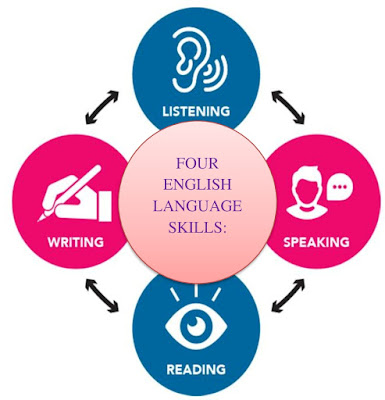FOUR ENGLISH LANGUAGE SKILLS: AN OVER- VIEW
FOUR ENGLISH LANGUAGE SKILLS: AN OVER- VIEW
According to a leading linguistic H.G. Widdoson, we use listening and
speaking in Oral communication and reading and writing communication. The
sender of the message uses the spoken or written form in order to communicate
his ideas. The recovery of the message utilizes the listening or reading skills
in order to interpret the message. We can therefore group these four skills in
two large groups.
1)
Speaking
] are Active Productive skills
2)
Writing
]
3)
Listening
] are Passive Receptive Skills
4)
Reading ]
The four
language skills are: listening, speaking, reading and writing, these skills are
developed to achieve communicative competence in the mother tongue or a second
language. To learn a language correctly, we have to develop the ability to
speak, listen, write and read in that language, that is, we have to master the
four linguistic skills: speaking, listening, writing and reading. Sometimes,
depending on the context in which we are learning the language, we develop one
or two of the skills a lot and we leave the others a little forgotten. For
example, if we study a language in a self-taught way, it is very likely that we
will develop written expression and reading comprehension much better than the
other two skills. If we are going to live in a country and we have never
studied the language before, when we are interacting with natives, it is most
likely that we will develop oral expression and listening comprehension much
more than the other two skills.
How can we
carry a balanced learning that helps us master the four language skills?
We simply must
always keep in mind that we have to practice all four, not one or two, but all
four language skills to master a language. And if we leave out any of them,
because it is more difficult or more boring, sooner or later we will have to
dedicate time to it, so it is better to practice all four from the moment we
start learning a language. In addition, this creates a more varied and enjoyable
learning.
The most
important thing to successfully master the four language skills is to enjoy
learning.
Reading
comprehension: Just think, what do I like to read? And look for information in
the language you are studying on this topic.
Written expression:
Do you find writing boring? You don't have to write a book. If you use social
media often, you can practice writing things that you would put on Facebook or
Twitter, for example.
Listening
comprehension: If you don't have the opportunity to listen to the language you
are studying on a daily basis, use the internet to practice. You can watch
videos, listen to songs in the language, whatever you like the most or feel
like at the time.
Oral
expression: To learn a language well you have to speak. Where do you live, no
one speak the language you are looking for? Then find someone to practice with
via video conference. You can find native teachers in the language, who will
give you online conversation classes. There are also many language exchanges by
videoconference that are completely free.
If you find
different activities in which you have a good time practicing the four language
skills, you are guaranteed success. You just have to organize a little. You can
make a weekly plan: you take a piece of paper, divide it into four parts and
write the activities you plan to do to practice each language skill.




Comments
Post a Comment